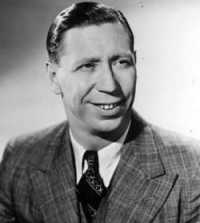George Formby (1904-1961) b. Wigan, England.
Coming from the northern music hall (his father George Formby Sr, was a music-hall favourite before him), and gaining a national audience through radio, Formby became the most popular male domestic star with British audiences in the late 1930s, alternating at the top of the polls with Gracie Fields. While Hollywood attempted to woo most other British box-office favourites of the period, including both Fields and Jessie Matthews, it is hard to imagine what they could have done with Formby.
Like his French counterpart, Fernandel, with whom he was often compared, his particular appeal resisted translation. His characters are based on sexual innocence: romantically inept, they nevertheless aspire to the girls of their dreams. His songs, which he sang to a symbolically small ukulele, are based on a complicit game with the audience about how far you can take sexual innuendo: while Gracie could be coy, George could be smutty. But however smutty it got, it was safe. George was just being naughty, and the audience could permit itself the joke because, coming from George, it could never be seriously offensive or sexually threatening. The game is peculiarly English, drawing both from the seaside postcards of Donald McGill and from the northern music-hall tradition, and surfacing again in the Carry On films.
Formby made his most popular films under contract to Basil Dean at Ealing, providing a voice of populist consensus immediately be the war and during its early years. He never recovered the pomp of those years, and when George in Civvy Street (1946) flopped, he returned to the music hall.
